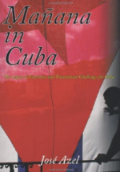Yes, as Alexis de Tocqueville noted in The Old Regime and the Revolution (1856): “…experience teaches that the most critical moment for bad governments is the one which witnesses their first step toward reform.” Raul Castro knows this as well, and post-communism will not be pre-democracy.
Tocqueville’s book analyzes French society before the French Revolution (1789-1799). In it he develops a theory of continuity arguing that, even though the French tried to dislodge themselves from the past and from the autocratic regime, they eventually reverted to a powerful central government. I have voiced similar concerns in my book Mañana in Cuba and other writings.
Even when the participants are truly committed to democratic governance, curbing the tendencies towards powerful central governments is a demanding undertaking; more so in Cuba, with a tradition of authoritarianism, and no governing elite with an ingrained democratic culture.
In the United States, we recorded the same tensions at the birth of the new nation. These impulses are eloquently articulated and demonstrated by the friendship, destroyed by political rivalry, and back to friendship, of two of the most notable Founding Fathers: John Adams and Thomas Jefferson.
During the Second Continental Congress in 1776, it was the eloquent John Adams who defended Thomas Jefferson’s Declaration of Independence. Both were architects of that document that gave birth to the new nation. Adams was the better speaker and Jefferson the better writer. As historians tell it, that was probably the last time that they agreed on anything political.
The irascible and ill-tempered Adams was a staunch Federalist and believer in a strong centralized government. The erudite, gentile Jefferson believed that central governments should be strictly limited in their powers. Adams and Jefferson embodied opposite political impulses of their revolutionary generation.
Jefferson, saw their struggle as a clean break from the past, the rejection of old political disciplines, and was hostile to extensive mechanism of governmental authority. He regarded the past as a “dead hand” of ingrained privileges and obstacles that must be discarded to allow individual freedom and energies to flow. He saw the economic and political wellbeing of the new nation as inversely proportional to the power of the central government.
Adams linked the success of the American Revolution to the traditions established in the colonial assemblies. Their correspondence created what political scientists consider the most intellectually extraordinary exchanges between statesmen in all of American history. It became an argument without end between Jefferson, the elegant Virginian, and Adams, the combative New Englander.
But, independently of their disagreements, Adams and Jefferson agreed on the fundamental liberal principle that sovereignty resides in the individual and not in some undemocratically appointed authority. They believed in the capitalistic principle that economic productivity hinges on free markets, and not on a state controlled economy. They shared the principle that all citizens are equal before the law, and the conviction that the individual and not the state is the central moral unit in society.
Their correspondence aired the contradictions that had been contained during the struggle for liberty. Adams, who reached out to Jefferson after decades of outright enmity, put it this way, “You and I ought not to die before we have explained ourselves to each other.”
As fate would have it, Adams and Jefferson died within hours of each other on July 4, 1826, the 50thanniversary of the day they signed the Declaration of Independence.
Fast forward to some time in the future when totalitarianism comes to an end in Cuba and the impulse to anchor the future in the immediate past confronts the desire for a fresh new start. Unfortunately, statesmanship of the Adams-Jefferson quality will not be in place, or even agreement on basic democratic values. Yet, the essence of the Adams-Jefferson conflict will surface.
For Cuba, post-communism is unlikely to yield a pre-democratic milieu in which a new nation-state can be founded on liberal democratic principles.
Please let us know if you  this article. this article. |
|






No comments:
Post a Comment